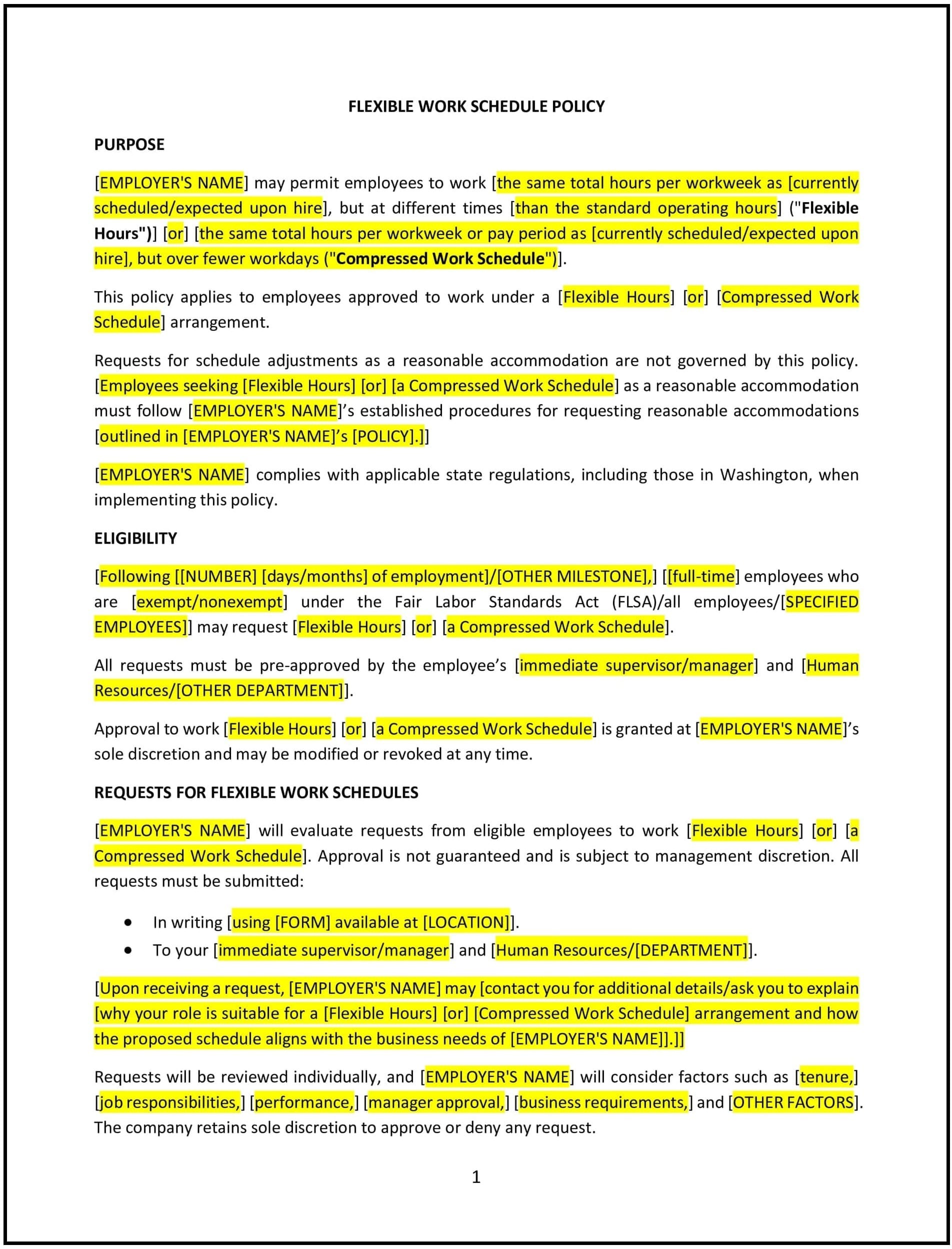Flexible work schedule policy (Washington): Free template
Got contracts to review? While you're here for policies, let Cobrief make contract review effortless—start your free review now.

Customize this template for free
This flexible work schedule policy is designed to help Washington businesses provide employees with flexibility in managing their work hours while ensuring that business needs are met. The policy outlines the procedures for requesting and implementing flexible work schedules, including part-time schedules, flextime, compressed workweeks, and remote work options. It ensures that flexible work arrangements support both the employee's needs and the company's operational requirements.
By adopting this policy, businesses can improve employee satisfaction, enhance work-life balance, and boost productivity by providing employees with greater control over their schedules.
How to use this flexible work schedule policy (Washington)
- Define eligible employees: Clearly specify which employees are eligible for flexible work schedules. The policy may apply to all employees, or only to certain departments or roles based on the nature of the work. Consider outlining any role-specific requirements or exceptions.
- Outline available flexible work options: Provide examples of the flexible work options available, such as flextime (choosing work hours within a specific range), compressed workweeks (e.g., four 10-hour days instead of five 8-hour days), or remote work. The policy should clarify which options are available and any limitations.
- Establish the process for requesting flexible work: Specify how employees can request flexible work arrangements, including the required notice period, documentation (if any), and the process for approval. The policy should encourage open communication between employees and managers to ensure mutual understanding and approval.
- Set expectations for performance and availability: The policy should clearly outline performance expectations and availability during flexible work arrangements. While employees may have flexibility in their schedules, the company must ensure that business needs are met, including availability during peak times or meetings.
- Address communication and collaboration: Provide guidelines on how employees with flexible schedules will stay connected with their teams. This may include expectations for attending meetings, responding to emails, or using collaboration tools during regular business hours.
- Promote a results-oriented approach: Emphasize that the success of flexible work arrangements depends on achieving results and meeting deadlines. The policy should encourage employees to focus on the quality and timeliness of their work rather than simply clocking in a set number of hours.
- Include provisions for reviewing and adjusting flexible work schedules: The policy should allow for periodic review of flexible work arrangements to ensure they are working effectively for both the employee and the company. This includes adjusting schedules if operational needs change or if performance issues arise.
- Promote compliance with Washington and federal laws: Ensure the policy aligns with Washington state labor laws and federal regulations, such as the Fair Labor Standards Act (FLSA) regarding overtime, meal breaks, and other employment conditions.
- Review and update regularly: Periodically review and update the policy to ensure it continues to be compliant with changes in Washington state laws, federal regulations, or the company’s operations. Regular updates ensure that the policy stays relevant and effective.
Benefits of using this flexible work schedule policy (Washington)
This policy offers several benefits for Washington businesses:
- Improves employee work-life balance: Offering flexible work options helps employees balance their professional and personal responsibilities, leading to improved job satisfaction and overall well-being.
- Increases employee retention: Employees are more likely to stay with a company that offers flexible work arrangements, which can reduce turnover and the costs associated with hiring and training new employees.
- Enhances productivity: By allowing employees to work during their most productive hours, flexible work schedules can lead to increased efficiency and output, benefiting the company’s bottom line.
- Supports a diverse and inclusive workforce: Flexible work arrangements can help attract and retain employees with diverse needs, such as parents, caregivers, or individuals with disabilities, creating a more inclusive work environment.
- Reduces absenteeism: By offering employees flexibility in their work hours, businesses can reduce absenteeism, as employees may be able to accommodate personal appointments, sick days, or family obligations without taking time off.
- Boosts employee morale: A flexible work schedule fosters trust between employers and employees, leading to higher morale and a positive company culture that values employee autonomy and well-being.
- Enhances talent acquisition: Offering flexible work options makes the company more attractive to top talent, especially those who prioritize flexibility in their work arrangements.
Tips for using this flexible work schedule policy (Washington)
- Communicate the policy clearly: Ensure all employees understand the flexible work schedule policy and the options available to them. Include the policy in the employee handbook and review it during onboarding. Provide ongoing communication about how the policy works and its benefits.
- Set clear performance expectations: While employees have flexibility in their schedules, it’s important to set clear expectations for performance, deadlines, and availability. Encourage employees to manage their time effectively to meet company objectives.
- Use collaborative tools: Provide employees with tools and resources to help them stay connected and collaborate effectively with their teams. This may include project management software, video conferencing tools, or messaging platforms.
- Ensure fairness and consistency: Apply the policy consistently across all employees to ensure fairness and equity. Avoid situations where some employees receive preferential treatment, as this can lead to dissatisfaction and resentment among other team members.
- Review flexible work arrangements regularly: Regularly assess how flexible work schedules are working for both employees and the company. Gather feedback from employees and managers to identify any areas for improvement or adjustment.
- Be open to adjustments: Allow flexibility in how schedules are implemented, but ensure that operational needs are met. The policy should allow managers and employees to adjust schedules when necessary to accommodate changes in workload or business priorities.